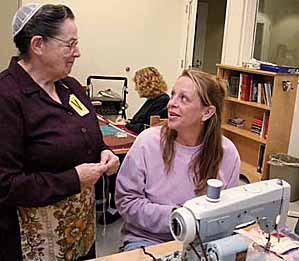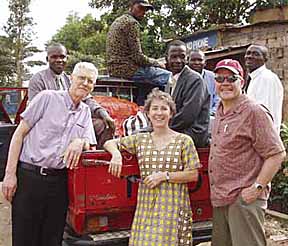Canadian Mennonite
Volume 11, No. 08
April 16, 2007

Sider challenges ‘comfortable’ Mennonites
Steinbach, Man.
The great divide in the Evangelical world—between evangelism and social action—is “unfaithful to the gospel of Jesus,” according to Ron Sider, who brought his message that the power of the gospel is in the integration of social action and evangelism to Steinbach Evangelical Mennonite Church last month.
In his first lecture, “Overcoming one-sided Christianity,” Sider anchored his presentations in a classic orthodox Christianity, arguing that a dichotomy between social action and evangelism is a result of a skewed theology that reflects an unbiblical choice between salvation as an individualized personal faith or salvation as redemption of systemic/structural brokenness. He said the gospel calls for both a personal, individual response and a call into a redeemed community that models God’s desire for a reconciled and restored creation.
Sider noted that recent work on climate change, AIDS and HIV initiatives and political activism give evidence that Evangelicals are beginning to integrate evangelism and social action.
Christian Peacemaker Teams (CPT) has the potential to expand Mennonite witness, Sider said, suggesting that the work of CPT needs to be at the heart of Mennonite identity. Mennonites have left their peace and justice witness to the most passionate activists, he said, allowing most congregations to avoid wrestling with systemic and structural injustices.
CPT needs pastors, denominational leaders and congregations to participate. Sider suggested that deploying a thousand or more Christian peacemakers in the Middle East would not only draw attention to the injustices but also impact political and economic realities and policies there.
His second lecture, “The scandal of the Evangelical conscience,” focused on the failure of practice in the contemporary evangelical church. Sider argued that too many Mennonite churches are “comfortable clubs of conformity” because of cheap grace, the diminishing of sin and rampant individualism. The call to be an alternative community is not a call to withdrawal, he said, but to “active engagement that puts the church out in front of the world in stunning contrast to the dominant culture” on issues like racial reconciliation, generosity and sexual practice.
In his final lecture, “Rich Christians in an age of hunger,” Sider said that God’s preferential option for the poor invites Christians to a humble engagement of the spiritual, cultural and structural powers that maintain injustice. The creation and management of wealth are not contrary to a biblical faithfulness, but need to reflect God’s kingdom values that everyone shares in the wealth, he said.
Sider said that one way to practise such justice is to ensure that everyone can participate in wealth creation by having access to capital. Globally, people who claim Christian faith control approximately 60 percent of the world’s wealth. If they would invest just 1 percent of their wealth in initiatives like micro-loans, the standard of living for the poorest billion residents of the world would increase by 50 percent.
Sider presented his lectures at the invitation of the Anabaptist Evangelical Fellowship; Mennonite Church Manitoba and the Chortizer Mennonite Church co-sponsored the event.
Blanket project brings healing and comfort to women in prison
Kitchener, Ont.
 |
Every Tuesday afternoon four women incarcerated at Grand Valley Institution for Women in Kitchener make blankets for Mennonite Central Committee (MCC) humanitarian aid shipments.
Krista, a mother of three children, has been involved in the program since it started in March 2006.
“I’m here [in prison] because I took a life,” says Krista. “I joined the program so that I can give something back to the world and to be at peace with myself. It brings tears to my eyes and goose bumps to be able to give something back to the world.”
Working with the women are 14 volunteers. The volunteers were recruited and trained by MCC Ontario to develop trusting relationships with the inmates who are serving sentences of two years or more in this federal institution. Just like women making blankets in church basements, they talk about the ordinary things in life—their families, favourite food, hobbies and skills.
“This is very peaceful and healing,” says Michelle. “It is like you are part of a group…. [T]here is more to me than my crime. I like to sew, I like to quilt and I like working with Mennonite women. They give of their time, not only to quilt, but also to see us. We work together as if we have known each other forever. It’s a nice feeling.”
This non-judgmental support is helping Michelle and others start the process of reintegration into society. “When we leave here we have to see ourselves not only as ex-cons but as members of society,” she says. “These [volunteers] don’t treat us like ex-cons. We talk about our children, our life, what we do and what we can do. It’s like being with my mother.”
Getting to know women serving time in prison is also changing the lives of volunteers. Anna Mary Brubacher, who has been involved with the program since it started, says that at first she was apprehensive about going into a prison. “But the first time you meet the women, you realize they are just like us—they are mothers, sisters and daughters,” she says. “They care about their children.”
Cheryl Flamenco Steiner, a Grand Valley correctional program officer working with employment and employability programs, says the volunteers create a safe and non-judgmental environment to assist women as they develop and strengthen employability skills.
Her mother, Irene Steiner, has been involved in promoting blanket-making for MCC for many years. In the past number of years, mother and daughter talked about the possibility of incorporating MCC blankets into an employment program.
The program, a partnership between the correctional facility and MCC Ontario’s material resources and restorative justice departments, became a reality in March 2006. It also receives community support from individuals and businesses through donations of fabric and sewing machines.
In the first 10 months, about 10 women participated in the program and completed about 40 blankets. Last December, the program expanded to two afternoons a week and moved to a larger space that can accommodate more women.
“This is not only meaningful employment,” says Flamenco Steiner. “They are developing relationships—that’s what makes this program so important. It is the unconditional support they receive from others that makes this a very unique and special space.”
Diamonds are forever: Congo and U.S. Mennonites learn together
Mbuji Mayi, Democratic Rep. of Congo
 |
On the road from Mbuji Mayi through the diamond fields, Benjamin Mubenga was asked by passersby if he was taking his white passengers to see diamonds.
Mubenga, a pastor and president of the Communaute Evangelique Mennonite (CEM), said he was on his way to visit churches. Much later, his passengers, five members of a Mennonite Church USA delegation to Congo, agreed that Mubenga was helping to shape diamonds of a different kind—congregations in the Eastern Kasai province of CEM who love Jesus and serve him in their communities.
The group was part of a church-to-church visit in Congo for two weeks earlier this year, to help build new relationships between Mennonite denominations in Congo and the U.S. with the encouragement of Mennonite World Conference (MWC). Children, youths and adults, numbering well over 100 at each stop, sang of their love for Jesus, and delegation members offered greetings on behalf of the MC USA congregations.
The group learned that adequate transportation—both appropriate vehicles and the lack of an infrastructure of roads—is one of the major obstacles to the growth of CEM churches.
Mubenga said another challenge for CEM is keeping people together in one conference when they speak different languages. And there has been serious conflict in the church, with leaders working hard to resolve it with the help of Mennonite Central Committee and MWC. Their task is made more difficult because none of the leaders receive payment for their denominational work.
CEM administers 60 schools with about 10,000 students. The church receives some payment from the government, but it is far less support than is needed to run the schools effectively.
In addition to training 25 new evangelists, CEM leaders said their goals include expanding their office facilities and building a health centre, primary and secondary schools and homes for some of their leaders on the land surrounding the Dipumba parish in Mbuji Mayi.
The plans for the Dipumba parish are impeded, however, until CEM can recover land from families who have unlawfully built their houses on land given to CEM by a former government.
Leaders from churches in both countries agreed it is difficult to build mature relationships where both churches can give and receive gifts. MC USA delegates repeatedly felt expectations in the parishes that they had come to give them money, despite Congolese leaders’ assertions each time that the visit was about building friendships.
“Our people can be motivated to be self-sufficient,” Mubenga said. “Our problem is how to get there to motivate them.”
Throughout the visit, delegation members were shown economic generation projects, including rabbit breeding, bread baking, and palm oil and grain producing. Congolese leaders said their congregations need to generate sources of income within the church, rather than expect help to come from outside the church.
Leaders of both countries talked together about the gifts they think the other church has to offer them. The U.S. church delegation said the Congo churches have vitality in worship, an understanding of generosity and endurance to remain faithful when times are difficult to offer American churches. Congo leaders said their American counterparts have political influence, experience in leadership training and resources to share.
On the road back to Mbuji Mayi, the 15-member SUV entourage jumped out of the vehicle to visit a diamond merchant who was a member of one of the CEM congregations. He showed them a handful of small, uncut diamonds worth more than $1,500.
Like these diamonds, leaders agreed, the initial gift-sharing efforts between Congo and U.S. churches are very small, but the potential can be very valuable.